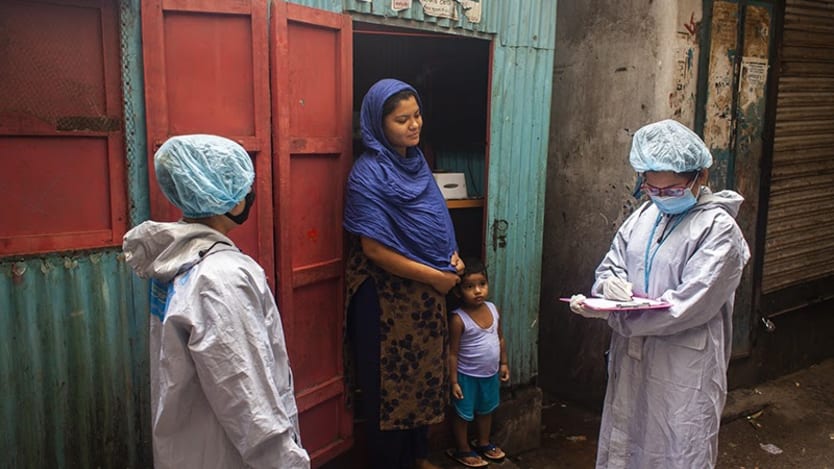
SACRAMENTO, Calif. — As COVID-19 lockdowns brought on-site data collection to a halt, groups focused on gender data had to find new ways to measure the status of girls and women across a range of indicators.
Women who might respond to in-person surveys are not likely to share anything sensitive with an unknown voice over the phone, said Madhuparna Das Joshi, senior adviser for gender and governance at the Center for Catalyzing Change, or C3, an organization that works to improve the lives of girls and women across six states in India.
This year, C3 has leveraged the relationships it had built with Panchayats, elected members of local village councils, by having them respond to mobile phone surveys on the impact of COVID-19 on girls and women.
This article is part of Focus on: Gender Data
This focus area, powered by UN Women, highlights how data is being used to inform policy and advocacy to advance gender equality. Gender data is crucial to make every woman and girl count.
As lockdowns made in-person data collection impossible, organizations were forced to explore nontraditional data sources, or combine traditional and nontraditional data. From mobile surveys to big data analysis, technology brings scale and speed to gender data collection, but it can also pose increased privacy risk.
As some in-person data collection resumes — with masked researchers at a safe distance — organizations are beginning to evaluate which of the gender data collection methods they adopted in crisis should remain part of their strategy.
Fast-tracking partnerships
A week after the COVID-19 outbreak was declared a global pandemic, UN Women conducted rapid assessment surveys across 11 countries in the Asia-Pacific region. The surveys included questions about health, domestic work, livelihoods, and other changes in circumstances, such as whether water sources were compromised.
UN Women partnered with mobile network operators to send text messages to their subscribers, storing responses on a data collection tool the organization built, which sits on its server.
While many rapid assessment surveys were conducted to assess the impacts of COVID-19, “few people were doing them right from a gender perspective,” said Sara Duerto Valero, regional adviser on gender statistics at UN Women’s Regional Office for Asia and the Pacific.
More Focus on: Gender Data
► Q&A: What early data says about gendered impacts of COVID-19
► Participatory gender data collection gains ground — but not without 'hard fight'
► Experts call for 'deeper data' on women's realities at UN World Data Forum
Traditionally, many surveys ask questions of the head of household, who are typically men. With rapid assessment surveys, it is critical to weigh samples so they are representative of the population, Valero said. Still, a major challenge is the mobile gender gap, the fact that women are less likely than men to own and use a mobile phone.
UN Women had not previously worked with mobile network operators in its gender data collection efforts, but the COVID-19 pandemic fast-tracked these partnership efforts.
“We had been thinking about running the survey and designing the questionnaire. It was a matter of designing partnerships with the MNOs. In Asia, that was easy,” Valero said. “The MNOs said, ‘Yes. We understand it’s a pandemic. Let’s do it.’ In many cases, we didn’t even need a contract.”
These partnerships with mobile network operators came together quickly in a time of crisis, but in non-crisis situations, UN Women tries to produce data in partnership with national statistical offices. “It is much more likely to be used if the government is involved in production,” Valero said.
Working with governments typically means long timelines, including designing the survey, which takes at least six months, and the training of enumerators. The research then entails between three and six months of data collection in the field, depending on the topic.
While rapid assessment surveys have been essential in the COVID-19 response, they do have limitations.
“We know they’re not as robust as a real survey,” Valero said. “There are things we cannot ask over the phone.”
For example, time use surveys, which are critical for understanding how much time women spend on unpaid care work, are typically conducted through daily time use diaries, and it’s impossible to get the same level of detail through mobile phone surveys.
And whereas in person enumerators can assess whether women are alone before asking sensitive questions, on the phone, others could see a message or overhear a conversation, potentially putting those women at risk, Valero said.
Combining traditional and nontraditional data
Has it become too dangerous to measure violence against women?
Collecting data on gender-based violence is a sensitive endeavor under any circumstance. Devex asks experts what it looks like now — when women may be in lockdown with their abusers.
As the COVID-19 mobility restrictions forced people to stay at home, some women were stuck inside with abusive partners, leading to an increase in gender-based violence. But this shadow pandemic, as it is often called, has been hard to track. Despite the rise in incidents, in some locations there has been a decrease in crime reports.
By combining traditional and nontraditional gender data collection methods, organizations can understand trends and make predictions in order to design more effective policies and interventions to prevent gender based violence.
In Mexico, Data-Pop Alliance, a nonprofit think tank, has joined forces with GIZ, the implementation organization of the German development agency, to identify domestic violence hotspots. They are drawing on data from Mexico City to construct a risk model so that decision-makers can make inferences about other regions of Mexico where there is far less data available on domestic violence.
Working together with government officials, Data-Pop Alliance and GIZ are combining a number of data sets, including legal reports of domestic violence, calls made to the Linea de Mujeres hotline, and mobility data from Facebook and Google.
“You might ask, ‘OK, what is the value if you know you are predicting something that is under reported?’” said Emmanuel Letouzé,director and co-founder of Data-Pop Alliance.
He said there is value in bringing data to the discussion on gender based violence so that local authorities, women’s organizations, and the national statistical office can get a sense of the problem and potential responses, and noted that this pilot in Mexico will inform work in other countries.
“This digital first world needs to bring everyone along — that goes for the gender sector as well.”
— Anna Lerner Nesbitt, program manager of global impact for data and artificial intelligence, FacebookData-Pop Alliance has also been in touch with the United Nations Population Fund, or UNFPA, which developed a decision tree for gender data collection on violence against women during COVID-19, about the need to prioritize women’s safety over data collection.
“We didn’t go for an approach that would require us to conduct a survey,” he said. “There are ways to conduct surveys that are relatively safe. But because of this feedback, we have taken more of a macro or big data approach. In the future, I would like to complement that with surveys.”
Leveraging big data
UN Women is partnering with the United Nations Population Fund and Quilt.AI — a company that uses big data and artificial intelligence to answer key questions about human behavior — to do big data analysis for online searches related to violence against women.
They are interested in seeing whether searches for services have increased since COVID-19 and whether people are finding the resources they need.
Many gender data experts argue that only in-person interviews are able to capture non verbal cues, but Anurag Banerjee, co-founder of Quilt.AI, notes that people sometimes open up online in ways that even skilled interviewers are not able to get them to do.
Quilt.AI has worked with clients including the Bill & Melinda Gates Foundation, the World Bank, and the Children’s Investment Fund Foundation. Because the company gathers all of its data online versus in person, COVID-19 has led to an increase in demand and business, Banerjee said.
Facebook has similarly relied on digital tools, including big data, in its gender data collection.
The company has worked to gender disaggregate existing data resources, like its population density maps, while also collecting new gender data through surveys on its platform, said Anna Lerner Nesbitt, program manager of global impact for data and artificial intelligence at Facebook.
Last month, the company released several new reports on gender equality in the context of COVID-19, including a survey conducted in partnership with the World Bank Group, UN Women, Ladysmith, and EqualMeasures2030 on “gender equality at home.”
A majority of respondents agreed that men and women should have equal opportunities, but there were gender differences between what men and women reported in asset ownership, unpaid care work, and financial decision-making.
Moving forward, Nesbitt said Facebook wants to do more work layering available gender datasets with other data related to the Sustainable Development Goals. She mentioned access to roads, and whether men and women have equal access to roads, as one example. Nesbitt added that Facebook is shifting its focus from releasing new datasets to building capacity for organizations to make use of these resources.
“This digital first world needs to bring everyone along — that goes for the gender sector as well,” she said.
Devex, with support from our partner UN Women, is exploring how data is being used to inform policy and advocacy to advance gender equality. Gender data is crucial to make every woman and girl count. Visit the Focus on: Gender Data page for more. Disclaimer: The views in this article do not necessarily represent the views of UN Women.



